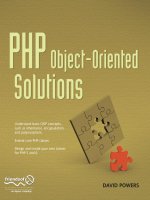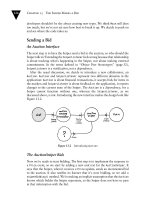Object oriented Game Development -P4 doc
Bạn đang xem bản rút gọn của tài liệu. Xem và tải ngay bản đầy đủ của tài liệu tại đây (226.58 KB, 30 trang )
up with a satisfactory structure for supporting arbitrary primitive types – virtual func-
tions are too inefficient because primitives are quite low-level and there are therefore
lots of them in a typical scene, which rather knocks inheritance of a primitive abstract
type on the head.
This leaves us with the following associations:
Renderer, Transform, Texture, Screen, Camera, Mesh, Model, Frame, Position, Rotation,
Viewport, Triangle, Quad, Palette, Colour, Light, Ambient, Directional, Spotlight.
Their relationships are shown in Figure 4.2.
4.3 Patterns
Patterns were made popular in the 1990s by the ‘Gang of Four’ (GoF) book
(Gamma et al., 1994). They represent the logical relationships between classes
that just keep appearing in your software, irrespective of whether you are writ-
ing spreadsheets, missile-guidance systems or resource managers.
Patterns are, at the very least, interesting, and more often than not they are
extremely useful. Often, you’re sitting there trying to work out how to get func-
Object-oriented game development76
Light
Light spot
*Quads
Model
Quads
*Triangles
Mesh
Triangles
*Textures
Texture
Clut
Clut
*Meshes
Frame
Position Rotation
Renderer
Screen
Screen
Viewport
Viewport
Camera
Transform
Position Rotation
Transform
Camera
*Children
Frame
Frame
Frame
Figure 4.2
Class diagram for a
basic renderer.
8985 OOGD_C04.QXD 1/12/03 2:32 pm Page 76
tionality from one class to be utilised by another without violating encapsula-
tion, or how to construct mechanisms to perform complex functions, and a flick
through the GoF book is all you need to gain the required insight. But this is
only half the battle – we still need to implement the pattern, and writing useful
pattern code still takes a bit of thought and effort. This section looks at a few of
the useful patterns and shows how they can be implemented with a reasonable
degree of generality and efficiency.
4.3.1 The interface
Also known as ‘protocol’, ‘compilation firewall’, ‘pimpl’
The first pattern we’ll look at is both simple and important. Remember earlier
we were concerned about dependencies in common components? When a
common component’s header file changed, all the dependent source modules
had to be recompiled. Any action, adding a method, changing an implementa-
tion detail or indeed the implementation, will trigger this rebuild. It’s an
irritating and schedule-consuming waste of time. Can we do anything about it?
The short answer is ‘Yes, we can’. However, the solutions (they are similar in
philosophy) are not applicable to all classes. Let’s look at the solution methods
before discussing their merits.
Interface
In Java, there is a specification of an interface – a set of functions that a class
that supports the interface must supply. We can do a similar thing in C++ by
defining a dataless class that consists of pure virtual functions.
// Foo.hpp
class Foo
{
public:
Foo();
virtual ~Foo();
virtual void Bar() = 0;
virtual void Pub() = 0;
};
// Foo.cpp
#include "Foo.hpp"
Foo::Foo()
{
}
Foo::~Foo()
{
Object-oriented design for games 77
8985 OOGD_C04.QXD 1/12/03 2:32 pm Page 77
// Always put an empty virtual destructor in the
// cpp file.
// Being virtual, it won’t be inlined anyway, and
// some compilers have problems with virtual
// destructors defined within headers
}
Since there is no implementation to change, the only condition that might trig-
ger a cross-package rebuild of many modules would be the addition or removal
of a method. For mature interfaces, this is considerably less likely than for an
‘in-progress’ module.
Now the trick. Define an instantiable class that uses the
Foo interface. Call
it
FooImpl to indicate that it’s an implementation of an interface:
// FooImpl.hpp
#include "Foo.hpp"
class FooImpl : public Foo
{
public:
FooImpl();
/*virtual*/ void Bar();
/*virtual*/ void Pub();
private:
int m_iData;
};
// FooImpl.cpp
#include "FooImpl.hpp"
FooImpl::FooImpl()
: Foo()
, m_iData(0)
{
}
void FooImpl::Bar()
{
m_iData = 1;
}
void FooImpl::Pub()
{
m_iData /= 2;
}
Object-oriented game development78
8985 OOGD_C04.QXD 1/12/03 2:32 pm Page 78
Let’s assume for the moment that we have some way of creating a FooImpl that
is internal to the component. What we get back is a pointer to a
Foo, which has
an identical virtual interface. We are free to modify
FooImpl as we please,
because external modules only ever include
Foo.hpp. The only snag is that since
we never see FooImpl.hpp, we have no way of creating a
FooImpl on the client
side. The solution is to have a manager class do the allocation for us:
// FooManager.hpp
class Foo;
struct FooManager
{
static Foo * CreateFoo();
};
// FooManager.cpp
#include "FooManager.hpp"
#include "FooImpl.hpp"
/*static*/
Foo * FooManager::CreateFoo()
{
return new FooImpl();
}
Pimpl
The name of the pattern is a contraction of ‘pointer to implementation’. Instead
of defining member data in the header file, we gather the data into a structure
that we place in the source file and forward declare a pointer to this structure as
the only member of our class:
// Foo.hpp
struct FooImpl;
class Foo
{
public:
Foo();
~Foo();
void Bar();
void Pub();
private:
FooImpl * m_this;
};
Object-oriented design for games 79
8985 OOGD_C04.QXD 1/12/03 2:32 pm Page 79
// Foo.cpp
struct FooImpl
{
int m_iData;
};
Foo::Foo()
: m_this( new FooImpl )
{
}
Foo::~Foo()
{
delete m_this;
}
void Foo::Bar()
{
m_this->m_iData = 1;
}
void Foo::Pub()
{
m_this->m_iData /= 2;
}
The interface method is cleaner but requires the extra manager or utility compo-
nent to create the instances. The pimpl method requires no virtual functions;
however, there is an extra dynamic allocation for every instance
new’d (and a
corresponding dynamic deallocation on destruction), and the
m_this-> nota-
tion is slightly unpleasant.
In the end, both solutions are essentially the same: in the interface method,
the
m_this is logically replaced by the implicit pointer to the class’s virtual
function table. Both use indirection to decouple their interfaces from their
implementation. So a similar analysis will work for both cases.
The first thing to notice is that neither system has any data in its header, so
we cannot in-line any functions. This is doubly so for the interface method
because, except in very rare circumstances, virtual functions cannot be in-
lined.
2
Also, since both systems require indirection, there is a performance
penalty for creating a class in this way.
Object-oriented game development80
2A function that is declared in-line virtual will be in-lined if, and only if, it is invoked explicitly via
the class::method() notation and there are no uses of references or pointers to base classes calling
that method.
8985 OOGD_C04.QXD 1/12/03 2:32 pm Page 80
What this means is that the interface is unsuitable for ‘light’ classes that
have high-performance requirements. For example, a vector class would not be
a good candidate for interface abstraction. However, a renderer or manager class
whose methods support non-trivial functionality (i.e. the overhead incurred by
the indirection is small compared with the amount of time spent in the func-
tion) may well be suitable. If many other components will be dependent on
ours, then there is some motivation to protect those clients from the evolution-
ary tos and fros of interface design and, more importantly, implementation
details of which class behaviour should be independent.
4.3.2 Singleton
A singleton is a class that logically has only a single instance in any application.
It is a programmatic error to create more than one of these, and the implemen-
tation should prevent a user doing so. There are several ways to achieve this,
and in this section we’ll evaluate their merits and the value of the pattern.
Introduction
First, what sort of classes are singletons? Well, what do we have only one of?
How about a display? That is a better candidate, though some systems may sup-
port multiple monitors. Since it is conceptually possible to have more than one
display, chances are that it is not a clear-cut choice for a singleton. A 3D model
is also not a good candidate – most games will have more than one! However, if
we keep all the game’s 3D models in one place (perhaps along with other data),
then we have a system that there is logically only one of – after all, if there are
several repositories, where do the models go? And in the end, we would need to
keep a repository of repositories, so the repository is a fundamental singleton.
In general, this reflects a pattern: large database objects that oversee a set of
controlled objects are natural singletons. Many other possibilities exist, though.
Implementation
Back in the bad old days of hack-and-hope C programming, we might have
declared a singleton as a global object, thus:
#include "ModelDatabase.h"
struct ModelDatabase g_ModelDatabase;
Yikes, a global variable! Anyone can read or write it from anywhere. Perhaps, a
little more safely, we can write;
#include "ModelDatabase.h"
static struct ModelDatabase s_ModelDatabase;
Object-oriented design for games 81
8985 OOGD_C04.QXD 1/12/03 2:32 pm Page 81
and we can control access to the model database via a suitable API:
void modeldb_Initialise();
void modeldb_Terminate();
void modeldb_LoadModel( const char * pModelName );
void modeldb_FreeModel( struct Model * pModel );
So far, so good. There is one instance of a model database in the module.
However, nothing prevents the user creating one of their own. If it controls
access to some set of system-wide resources, that might create all sorts of unde-
fined havoc.
Also notice the Initialise and Terminate calls. At some suitable points in the
game, we need to call these. When we graduate to C++, we get the opportunity
to call these automatically via constructors and destructors:
#include "ModelDatabase.hpp"
namespace
{
// Data declared in here is private to this module.
ModelDatabase s_ModelDatabase;
}
ModelDatabase::ModelDatabase()
{
// Do what we did in modeldb_Initialise().
Initialise();
}
ModelDatabase::~ModelDatabase()
{
// Do what we did in modeldb_Terminate().
Terminate();
}
We’re still stuck with the fact that we can create any number of model data-
bases. And now that there is a physical object rather than a procedural interface
to interact with, the user needs to get hold of the single instance. We solve these
(linked) problems with the following structure:
// ModelDatabase.hpp
class ModelDatabase
{
Object-oriented game development82
8985 OOGD_C04.QXD 1/12/03 2:32 pm Page 82
public:
// There’s only one of a static object – just what
// we need!
static ModelDatabase & Instance();
// …
private:
// Private ctor and dtor!
ModelDatabase();
~ModelDatabase();
static ModelDatabase c_Instance;
};
// ModelDatabase.cpp
#include "ModelDatabase.hpp"
ModelDatabase ModelDatabase::c_Instance;
/*static*/
ModelDatabase & ModelDatabase::Instance()
{
return c_Instance;
}
We can now access the instance in this fashion:
#include "ModelDatabase.hpp"
int main( int argc, char ** argv )
{
ModelDatabase & aDb = ModelDatabase::Instance();
//…
return 0;
}
The private lifecycle (constructor and destructor) of the class prevents users
from creating instances. The only instance that can be created is the
c_Instance static member – and since it is a member, its constructor and
destructor can be called in member functions. Voila!
A variant of this approach is to declare the static instance of the singleton
inside the
Instance() function:
/*static*/
ModelDatabase & ModelDatabase::Instance()
{
static ModelDatabase anInstance;
Object-oriented design for games 83
8985 OOGD_C04.QXD 1/12/03 2:32 pm Page 83
return( &anInstance );
}
The bonus here is that the instance is not constructed until the first time
Instance() is called. C++ has added an invisible code block to construct the
object the first time the thread of execution enters the code block, and it uses
the standard library call
atexit() to schedule calling the destructor. One prob-
lem with this variant is that (at least currently) some compilers have trouble
with the private constructors and destructors, to the extent that you may have
to make them public, thus weakening the intent of the pattern.
This is a common way of implementing singletons. It will work for a large
number of applications, but the pattern of implementation has a flaw or two.
First, the single instance is constructed at file scope. Regrettably, C++ has no
rules about the order of construction – if another object at file scope in another
module requires ours and the model database has not yet been constructed,
well, whatever happens is not good. Similarly, our class can fail to initialise cor-
rectly if it depends on another system not yet constructed. Second, by
constructing a static instance, we allow for only a single behaviour of the single-
ton. What would happen if we wanted – or needed – to allow the user to
subclass the singleton? For example, supposing we wanted to change the behav-
iour of the database depending on a variable read at run time from an
initialisation file. Then it makes sense to have a pointer to an instance instead
of an object itself:
// ModelDatbase.hpp
class ModelDatabase
{
public:
// as before
private:
static ModelDatabase * c_pInstance;
};
class ModelDatabaseFast : public ModelDatabase
{
//…
};
// ModelDatabase.cpp
#include "ModelDatabase.hpp"
#include "IniFile.hpp"
ModelDatabase * ModelDatabase::c_pInstance = 0;
Object-oriented game development84
8985 OOGD_C04.QXD 1/12/03 2:32 pm Page 84
/*static*/
ModelDatabase & ModelDatabase::Instance()
{
if ( c_pInstance == 0 )
{
if (IniFile::GetString( "modeldb" )== "fast" )
{
c_pInstance = new ModelDatabaseFast;
}
else
{
c_pInstance = new ModelDatabase;
}
}
return( *c_pInstance );
}
That solves that problem. However, we have a new one (no pun intended!) – we
have dynamically allocated the object on the heap and will have to delete it at
some point around program termination. I say ‘at some point’ because in a non-
trivial application many classes will delete resources at shutdown and we need
to avoid deleting objects twice or not at all, or accessing an already deleted
resource in a destructor.
We could add a static
Terminate() method, but it could be a thorny issue
as to when we call it. We’d really like it to be called at global scope because most
systems will have purged their resources by then. Can we arrange that? Well, yes
we can. We can use the STL’s template class
auto_ptr, which I summarise here:
namespace std
{
template<class T>
class auto_ptr
{
public:
explicit auto_ptr( T * pItem );
~auto_ptr() { delete m_pItem; }
T * operator->() { return m_pItem; }
private:
T * m_pItem;
};
}
Object-oriented design for games 85
8985 OOGD_C04.QXD 1/12/03 2:32 pm Page 85
The important part is that destructor: the pointer is deleted when the auto_ptr
created with it goes out of scope.
We can plug this into our singleton class:
// ModelDatabase.hpp
#include <memory>
class ModelDatabase
{
private:
// Since the destructor is private, the template
// class needs permission to delete it. There is
// no violation of encapsulation, though.
friend class std::auto_ptr<ModelDatabase>;
static std::auto_ptr<ModelDatabase> c_InstancePtr;
};
// ModelDatbase.cpp
#include "ModelDatabase.hpp"
std::auto_ptr<ModelDatabase>
ModelDatabase::c_InstancePtr(0);
/*static*/
ModelDatabase & ModelDatabase::Instance()
{
if ( c_InstancePtr.get() == 0 )
{
c_InstancePtr = new ModelDatbase;
}
return( *c_InstancePtr.get() );
}
So have we finally arrived at our ‘perfect’ singleton? Well, not quite. We can still
have problems with the order of destruction of file-scope objects and, frustrat-
ingly, there is no simple solution to this.
3
Object-oriented game development86
3 One solution is to specify an integer order of destruction of singletons. A management API then
uses the standard library function atexit() to schedule the deletions in the required order.
8985 OOGD_C04.QXD 1/12/03 2:32 pm Page 86
In use
Singletons can reduce the amount of unnecessary dependencies that creep into
your code. Consider the model database class existing in the object framework
shown here:
If we’re in the
Draw() routine in the Level class, here’s a snippet of the code we
might need to use:
// Level.cpp
#include "Level.hpp"
#include "Game.hpp"
#include "DataModel.hpp"
#include "ModelDatabase.hpp"
#include "Renderer.hpp"
//…
void Level::Draw( Renderer * pRenderer )
{
ModelDatabase & aModelDb =
g_pGame->GetDataModel()->GetModelDatabase();
Model * pSkyModel = aModelDb.GetModel( "sky" );
}
Notice that we have to go to the top of the inheritance hierarchy (Game), then
descend all the way down to get the class we require. To do this, we need to
include files that may have little or no other relevance to us, which increases
coupling, compile and link time and decreases reusability.
Contrast the same code using a singleton:
// Level.cpp
#include "Level.hpp"
#include "ModelDatabase.hpp"
#include "Renderer.hpp"
Object-oriented design for games 87
DataModel
Level ModelDatabase
Model databaseLevel
Game
Data model
8985 OOGD_C04.QXD 1/12/03 2:32 pm Page 87
// …
void Level::Draw( Renderer * pRenderer )
{
ModelDatabase & aDb = ModelDatabase::Instance();
Model * pSkyModel = aDb.GetModel( "sky" );
}
Since we don’t own the model database, we are not responsible for creating it or
destroying it, we don’t need to cache references to it and we reduce coupling to
auxiliary classes.
Before we get too carried away with ourselves, though, we should perhaps
reflect on the fact that much the same effect can be obtained using a C-style
procedural interface
void Level::Draw( Renderer * pRenderer )
{
Model * pSkyModel = modeldb_GetModel( "sky" );
}
which is a little more readable. The singleton only really improves on this by
the ability to have polymorphic behaviour determined at run time. If you do
not need this, then there may be a convincing argument about using a proce-
dural interface rather than a singleton.
There is a related pattern that is a hybrid of the singleton and the proce-
dural interface. Its technical name is a monostate. This is slightly misleading,
since there may be no state (i.e. dynamic member data) associated with the
class. The implementation looks like this:
class ModelDatabase
{
public:
static Model * GetModel( const char * pName );
static void Initialise();
static void Terminate();
private:
static std::list<Model *> c_Models;
};
Other than being pure C++, there is little reason to favour this over a procedural
interface. There are some very minor annoyances – a user can create an instance
of this class, though they can’t do much with it. Typically, it’s poor form to
write a class and then actively prevent polymorphic extension, and I would sug-
gest that monostates are poor compromises.
Object-oriented game development88
8985 OOGD_C04.QXD 1/12/03 2:32 pm Page 88
A generic implementation?
After writing a few singletons, you’ll notice that you get a bit bored with writing
the near-same
Instance()
function every time (our current application has at
least five singletons and is growing). Can we write a template to automatically gen-
erate a singleton? Well, the answer is a qualified ‘yes’. Here is an example template:
template<class T>
class Singleton
{
public:
static T & Instance();
private:
Singleton();
~Singleton();
};
template<class T>
T & Singleton<T>::Instance()
{
T anInstance;
return( anInstance );
}
Certainly, that saves our fingers from typing unnecessarily repetitive characters.
To create a singleton, we need to declare only:
class ModelDatabase { /*…*/ };
Singleton<ModelDatabase> s_ModelDatabase;
Excellent – except for one thing. It is the Singleton<ModelDatabase> that there
is exactly one of, not the ModelDatabase. The user is free to create any number
of additional instances other than the specified one. The definition of a single-
ton was that there could be only a single instance by definition. What we have
created is, alas, not a singleton.
4.3.3 Object factory
The object factory allows us to address a shortcoming of C++. We’d like to be
able to write
class Object { /*…*/ };
class Rocket : public Object { /*…*/ };
class Npc : public Object { /*…*/ };
Object-oriented design for games 89
8985 OOGD_C04.QXD 1/12/03 2:32 pm Page 89
Type aType = Rocket;
// Allocates a rocket.
Object * pObject = new aType;
but (alas) the language does not support type semantics in this way. The object
factory pattern applies when you have a hierarchy of objects that need to be cre-
ated dynamically. Typically, you do not know ahead of time exactly what types
of object, or how many, you will create. For example, you could be creating
objects based on the contents of an external script file.
A simple – and common – approach to writing a factory is to create an enu-
merated type that represents the different flavours of object you can create:
// Object.hpp
class Object
{
public:
enum Type
{
NPC,
ROCKET,
DUCK,
// New types above here.
NUM_TYPES
};
// This is the ‘factory’.
static Object * Create( Type eType );
};
// Object.cpp
#include "Object.hpp"
#include "Rocket.hpp"
#include "Duck.hpp"
#include <cassert>
/*static*/
Object * Object::Create( Type eType )
{
switch( eType )
{
case NPC : return new Npc;
case ROCKET: return new Rocket;
Object-oriented game development90
8985 OOGD_C04.QXD 1/12/03 2:32 pm Page 90
case DUCK : return new Duck;
default:
// Handle the error.
assert( !"Object::Create(): unknown type" );
break;
}
}
Common this may be, but there are two big problems with this method, and
both are related to the enumeration
Type. First, if we are loading and saving the
integer values of the type, then the application that writes them must be syn-
chronised with the game that reads them. This may involve sharing the
Object.hpp include file, which may or may not be possible or convenient.
Even if it is possible and convenient, there is a bigger problem: mainte-
nance. In order to add a class to the factory, we need to update the
enumeration. That means editing the header file of the base class. And that
forces a rebuild of the base class and all of the subclasses. Ouch! We’d really like
to be able to add classes at will without recompiling the project.
Note also that the Object.cpp file includes all the headers of all the sub-
classes. As the number of subclasses grows, this becomes a compilation and
linking bottleneck – much thrashing of disk to be suffered. Clearly, we need to
do better than this.
First, those enumerations: bin them! If you can afford the hit, replace them
with string constants: although string compares are relatively inefficient next to
integer comparisons, the act of creating an object is relatively expensive com-
pared with either, and if your game is manufacturing many classes every frame,
you may need to have a really hard look at your architecture.
// Object.hpp
class Object
{
public:
static Object * Create( const char * pType );
};
// Object.cpp
#include "Object.hpp"
#include "Rocket.hpp"
#include "Npc.hpp"
#include "Duck.hpp"
#include <cassert>
#include <cstring>
/*static*/
Object-oriented design for games 91
8985 OOGD_C04.QXD 1/12/03 2:32 pm Page 91
Object * Object::Create( const char * pType )
{
if ( !strcmpi( pType, "rocket" ) )
return new Rocket;
else if ( !strcmpi( pType, "npc" ) )
return new Npc;
else if ( !strcmpi( pType, "duck" ) )
return new Duck;
else
{
assert( !"CreateObject() : unknown type" );
}
return 0;
}
Note the use of case-insensitive compares: life is just too short to track down
bugs due to case issues.
This removes the dependency on the Object.hpp header file. Now we can add
a manufactured class, and only the implementation file need change. We can
weaken the dependencies further by moving the factory to a separate component:
// ObjectFactory.hpp
class Object;
struct ObjectFactory
{
static Object * CreateObject( const char* pType );
};
// ObjectFactory.cpp
#include "ObjectFactory.hpp"
#include "Object.hpp"
#include "Rocket.hpp"
#include "Npc.hpp"
#include "Duck.hpp"
/*static*/
Object * ObjectFactory::CreateObject( const char *pType )
{
// As before.
}
We are still left with a compilation and linkage bottleneck due to these includes,
and we are still a bit worried about all those string compares. What can we do
Object-oriented game development92
8985 OOGD_C04.QXD 1/12/03 2:32 pm Page 92
about these? Quite a bit, as it happens. We need to alter things a little, but don’t
worry: it’s for the better.
We move from a hard-coded (compile-time) set of objects we can make to a
run-time set. Each class that requires being manufactured in a factory is obliged
to register itself at startup. When it does so, it supplies its name and a pointer to
a function that manufactures an object instance. We store these in an associa-
tive map, such as the STL’s
std::map. Storing the entries in this data structure
will greatly increase the efficiency of the look-up process. (Note that because all
object classes are registered with a single instance, an object factory is a good
candidate for being a singleton.)
// ObjectFactory.hpp
#include <map>
#include <string>
class ObjectFactory
{
public:
typedef Object * (*tCreator)();
// Note that we need to associate strings, not
// char *s because a map requires strict ordering:
// the keys must define the operators < and ==.
typedef std::map<std::string,tCreator> tCreatorMap;
bool Register(const char *pType, tCreator aCreator);
Object * Create( const char * pType );
static ObjectFactory & Instance();
private:
ObjectFactory();
~ObjectFactory();
tCreatorMap m_Creators;
};
// ObjectFactory.cpp
#include "ObjectFactory.hpp"
// Ugly macro for brevity.
#define VT(t,c) tCreatorMap::value_type((t),(c))
using std::string;
Object-oriented design for games 93
8985 OOGD_C04.QXD 1/12/03 2:32 pm Page 93
bool ObjectFactory::
Register( const char * pType, tCreator aCreator )
{
string str = string(pType);
return m_Creators.insert(VT(str,aCreator)).second;
}
Object * ObjectFactory::Create( const char * pType )
{
tCreatorMap::iterator i =
m_Creators.find( string( pType ) );
if ( i != m_Creators.end() )
{
tCreator aCreator = (*i).second;
return aCreator();
}
return 0;
}
// Rocket.cpp
#include "Rocket.hpp"
#include "ObjectFactory.hpp"
// Another macro to save printing space.
#define OF ObjectFactory::Instance()
namespace
{
Object * createRocket()
{
return new Rocket;
}
// This code ensures registration will be invoked at some
// time before entering main().
bool s_bRegistered =
OF.RegisterClass("rocket",createRocket);
}
Object-oriented game development94
8985 OOGD_C04.QXD 1/12/03 2:32 pm Page 94
One further point is worth making: this implementation can be made generic
very easily via the use of templates:
// GenericFactory.hpp
#include <map>
#include <string>
template<class T>
class GenericFactory
{
public:
typedef T * (*tCreator)();
typedef std::map<std::string,tCreator> tCreatorMap;
bool Register(const char *pType, tCreator aCreator);
T * Create( const char * pType );
static GenericFactory<T> & Instance();
private:
// Much as before.
};
// Implementation goes here.
// ObjectFactory.hpp
#include "GenericFactory.hpp"
#include "Object.hpp"
typedef GenericFactory<Object> ObjectFactory;
Unlike the singleton pattern, the object factory pattern generalises very nicely. By
using a registration method rather than a static compile-time implementation, we
can decouple the created data types from each other as well as from the factory.
4.3.4 Manager
A common pattern is when a number of similar, hierarchically related classes
exhibit some collective, intelligent behaviour. This is often quite difficult to code
and results in a rather un-object-oriented structure: objects that need to be aware
of other, similar objects. This often results in increased complexity in otherwise
simple objects, and it may even lead to significant coupling between classes.
In such situations, a manager class can help sometimes. It takes responsibil-
ity for creation, deletion and – more to the point – the cooperative (synergistic)
behaviour between the classes it manages. A manager is a hybrid pattern. First,
it is a very likely candidate to be a singleton. Second, since it may well be able
to create and destroy families of classes, it will behave like an object factory.
Figure 4.3 shows A typical manager pattern.
Object-oriented design for games 95
8985 OOGD_C04.QXD 1/12/03 2:32 pm Page 95
4.3.5 Visitor/iterator
Looking at the manager pattern above, we can see that the controlled objects will
be stored in some kind of container class: an array, list, or more exotic animals
such as hash tables or binary trees. Whichever we choose – which will depend on
how the manager needs to access the contained objects – will be a private encap-
sulated detail of the manager’s implementation. Consider a ThingManager that
manages a bunch of classes called Things. Assume we have a dynamic array class
that expands (and maybe shrinks) according to the storage requirements:
class Thing;
class ThingManager
{
public:
void AddThing( Thing * pThing );
// etc
private:
array<Thing *> m_Things;
};
This is fine, so long as we don’t need to give anything outside of manager some
access to the Things. Do we then add the following line?
class ThingManager
{
public:
const array<Thing *> & GetThings() const;
// as before
};
Object-oriented game development96
Derived class 2
Manager
Base class
Factory
Derived class 2
*Managed objects
Factory
Figure 4.3
Class diagram for an
abstract manager.
8985 OOGD_C04.QXD 1/12/03 2:32 pm Page 96
Consider the following code that uses Things (which have a Print() method,
for argument’s sake):
const array<Thing *> & Things = aManager.GetThings();
for( int j = 0; j < Things.size(); ++j )
{
Thing * pThing = Things[j];
pThing->Print();
}
Fine, that works – until we have the bright idea that storing Things in a hash
table is a much better approach because we do a lot of name- or ID-based
look-up:
class ThingManager
{
public:
private:
hash_table<string,Thing *> m_Things;
};
Now we’re a little bit stuck. We may have written a lot of random-access code
that plays with arrays of Things, and now that code is useless. The exposure of
the Thing array has poked a great big hole in our encapsulation, and now that
we’ve changed the manager – as is our wont – we’re faced with maintenance
when we really wanted to get a move on.
In general, anything that exposes how your implementation works to the
outside world, which should not really care, is not a good thing. Note that we
don’t have to expose an internal type: only something that behaves like that type!
class ThingManager
{
public:
int GetNumberOfThings() const;
const Thing * GetThing( int n ) const;
};
is nearly as bad, as it still has the smell of an array.
How, then, do we access internal data in a way that’s independent of how the
data are stored in the manager class? That’s where visitors and iterators come in.
Object-oriented design for games 97
8985 OOGD_C04.QXD 1/12/03 2:32 pm Page 97
Visitor classes
Visitors are controversial. They can turn into a maintenance bottleneck, which
can easily defeat the benefit gained by using them. For this reason, they are best
used in limited circumstances, particularly when the controlled classes are in a
shallow hierarchy (i.e. there are only a few well-defined concrete subclasses).
To start with, let’s look at the visitor pattern when dealing with only a
single class. We’ll stick with our Things for this. Then we’ll look at how to
extend the concept to larger hierarchies.
Visitors are the modern-day equivalent of enumerator-like callback func-
tions, as seen all over the place in Windows SDK and DirectX. For example, we
may write the manager class in pseudo-code, thus:
class ThingManager
{
public:
typedef void (*tThingCb)( Thing *, void * );
void VisitThings( tThingCb aThingCb, void * pUser )
{
for_each pThing in m_Things
{
aThingCb( pThing, pUser );
}
}
private:
Collection<Thing *> m_Things;
};
The problem with this is that only one parameter is supplied to pass in context
information, and that parameter is the nasty typeless
void *. That can lead to
all sorts of fun and games, not to mention bugs. For instance, what happens if
we need to pass two pieces of context information into the callback? Then we
might be forced to write
struct Context
{
int iData1;
int iData2;
};
Context * pContext = new Context;
pContext->iData1 = //…
pContext->iData2 = //…
aThingManager.VisitThings( MyCallback, pContext );
delete pContext;
Object-oriented game development98
8985 OOGD_C04.QXD 1/12/03 2:32 pm Page 98
which is not exactly performance code and can easily result in memory leaks
or worse.
Consider the alternative:
class ThingVisitor
{
public:
virtual void VisitThing( Thing * pThing ) = 0;
};
In itself, it does nothing. But – by the power of inheritance – we can define our
subclass like this:
class MyThingVisitor : public ThingVisitor
{
public:
MyThingVisitor( int iData1, int iData2 )
: m_iData1( iData1 )
, m_iData2( iData2 )
{
}
void VisitThing( Thing * pThing )
{
pThing->DoSomething(m_iData1,m_iData2);
}
private:
int m_iData1;
int m_iData2;
};
Now we can write our visitor call as:
class ThingManager
{
public:
void VisitThings( ThingVisitor & aVisitor )
{
for_each pThing in m_Things
{
aVisitor.VisitThing( pThing );
}
}
};
Object-oriented design for games 99
8985 OOGD_C04.QXD 1/12/03 2:32 pm Page 99
What we’ve effectively done here is add a new virtual function to the
ThingManager from the outside. Clearly, this is a powerful paradigm. We have
extended the functionality of the manager without rupturing the encapsulation
of the class.
It gets a little more fiddly when there is a hierarchy of managed objects.
Here’s a subset of a real example taken from the project we’re currently working
on. A class diagram will set the scene succinctly (see Figure 4.4).
Our LightManager supervises the creation, destruction and use of a number
of lights, each of which can be one of several flavours – here, limited to two –
point and directional. This gives us a choice of how to store the lights within
the manager class: either we store the different types of light in separate collec-
tions, or we maintain a single heterogeneous collection of all lights. We choose
to do the latter as it simplifies what follows.
As part of the lighting calculations, we need to be able to determine which
lights affect which objects in the world, as to light every object with every light
would degrade performance and not be visually correct. Since the light manager
should not be required to know of the existence of objects in the world, it is
therefore the duty of the objects themselves to work out which lights affect
them. We decided to use the Visitor pattern to implement this. The difference
here is that different types of light need to be treated differently by the objects.
The LightVisitor looks like this:
class LightVisitor
{
public:
virtual void VisitPoint( PointLight * ) = 0;
virtual void VisitDirectional( DirectionalLight * ) = 0;
};
Object-oriented game development100
PointLight
LightManager
Light
DirectionalLight
*Lights
Vector3Float
Position
Radius
Position
Direction
Figure 4.4
Light manager
framework.
8985 OOGD_C04.QXD 1/12/03 2:32 pm Page 100









